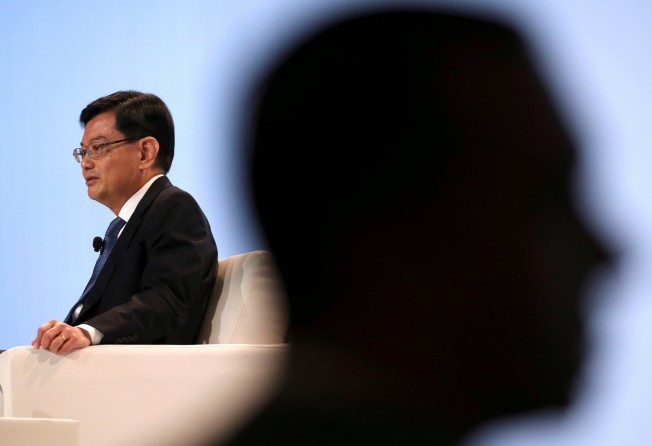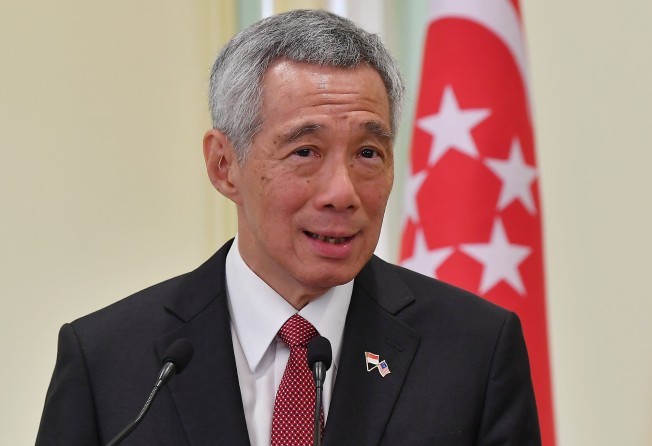
Lawrence Wong made Singapore finance minister as Lee Hsien Loong reshuffles cabinet
- In one of the biggest reshuffles of recent years, Wong will take over the finance portfolio from Heng Swee Keat, putting him among the favourites to become the country’s next leader
- The reshuffle affects seven ministries. Chan Chun Sing becomes education minister and Ong Ye Kung becomes health minister. Heng retains his position as deputy prime minister

Singapore’s Prime Minister Lee Hsien Loong on Friday named Lawrence Wong as the country’s next finance minister, signalling that the 48-year-old - the public face of Singapore’s Covid-19 response - may be among the favourites to become the country’s next leader after the previous heir apparent stepped aside.
Analysts said heavyweight new portfolios given to two other likely contenders to succeed Lee – Chan Chun Sing and Ong Ye Kung – meant they remained in contention for the job.
Lee’s retention of his most senior lieutenants in the important defence, home affairs and foreign ministries meanwhile underscored that he has no intent of rocking the boat while the Covid-19 crisis continues, the observers said.
Wong will take over the finance ministry from Heng Swee Keat, who earlier in April said he was stepping aside as prime minister-designate.
As part of that move, Heng, 60, relinquished the influential finance ministry portfolio but remains deputy prime minister.

Wong’s change in portfolio was part of a major cabinet reshuffle with seven of the city state’s 15 ministries getting new ministers.
In a press conference, Lee said he held off on making changes to the health, manpower and trade ministries last year – after a July general election – because the country was still in the thick of battling Covid-19. He was making the changes now as the public health situation was more stable, he said.
Lee said he was moving members of the ruling People’s Action Party’s (PAP) 4G, or fourth generation, group to new portfolios so that they could gain new experience and exposure after earlier rotations. The new appointments take effect on May 15.
Wong is one of four ministers in the 4G group of ministers who are seen as potential replacements for Heng.
The former high-flying civil servant has stood out in his performance as one of the government’s two key ministers helming a task force to deal with the coronavirus pandemic.
“Lawrence has been assisting Swee Keat as second minister since 2016, so he has the experience, and is a natural fit for the job,” Lee said at the press conference.
Chan Chun Sing, the current trade and industry minister – and among those seen as potential successors to Lee – will assume Wong’s education minister portfolio.
Ong Ye Kung, the current transport minister who is also seen as a possible future prime minister, will take over as health minister from Gan Kim Yong. Ong, 51, will also co-chair the multi-ministry Covid-19 task force alongside Wong.
Gan, a two-decade veteran of Lee’s government, will take over Chan’s role as trade and industry minister.

Nydia Ngiow, a Singapore-based director with the BowerGroupAsia consultancy, said the new positions given to Wong, Ong and Chan all seemed consequential.
While Wong received the influential finance ministry, Ong’s health ministry and Chan’s education ministry were also key government departments with among the largest budgets in the administration, she noted.
Other political observers said the performance of these three ministers would likely be put in the spotlight ahead of the PAP’s selection of a new successor to Lee.
The PAP has for decades maintained a tradition of electing its top leader through consensus among the new generation of senior leaders.
Heng was appointed in such a manner in 2018, and Lee in April 2019 made him the country’s sole deputy prime minister.
But Heng, who has recovered from a stroke in 2016, said on April 8 that with Lee now staying on longer than planned due to the Covid-19 pandemic, it would be better for a younger person to become the country’s fourth prime minister.
Inderjit Singh, a former PAP MP, said he believed the leadership race was now “back to the start”.
“In my opinion the reshuffle points to no clear PM candidate and that it will be some time before the potential PM designate appears,” he said.
In my opinion the reshuffle points to no clear PM candidate
“Everyone has been given a new ministry and I believe the PM and his senior ministers will be paying close attention to performance and based on performance we will see who emerges as the front runner,” Singh added.
National University of Singapore (NUS) political scientist Chong Ja Ian agreed, saying the new roles for the trio of Chan, Ong and Wong in important portfolios would serve as the latest test of their leadership mettle.
Woo Jun Jie, a research fellow with the Institute of Policy Studies, a local think tank, suggested Friday’s reshuffle might be to do with the operational needs of the government, given the continuing pandemic.
“We may be responding to Covid-19, and this is the second cabinet reshuffle in a very short period of time,” Woo said, adding that there could be “more reshuffles in increasingly short periods of time as the government adjusts to this very unstable situation in the world”.
Another NUS political scientist, Bilveer Singh, said the changes – which did not highlight a clear frontrunner to the succession race – showed Prime Minister Lee was “going to be around for a while”.
“I think the PM wants to make one thing clear: he does not want disruption. He does not want to be disruptive. He knows we are in times of uncertainty,” the professor said.
Gillian Koh, also of the Institute of Policy Studies, said Lee’s decision to keep more experienced ministers at the helm of the foreign, trade and industry and defence ministries, was noteworthy. While consequential, the changes remained “a bit of a trying out and testing out phase” for the 4G group, she said.
Friday’s reshuffle is one of the biggest shake-ups in Lee’s cabinet in recent years.
Lee had hinted on April 8 – when Heng announced his decision to step aside – that he would make “consequential” changes to the entire cabinet along with the appointment of a new finance minister.
The finance minister portfolio is traditionally reserved for heavyweights in the ruling PAP. Heng was handed the position in 2015, and he succeeded Tharman Shanmugaratnam – the highly popular former central bank chief who currently serves as a senior minister.
Prime Minister Lee, the son of the PAP’s late co-founder and Singapore’s first prime minister Lee Kuan Yew, also served as finance minister before he became prime minister in 2004, taking over from his father’s successor Goh Chok Tong.